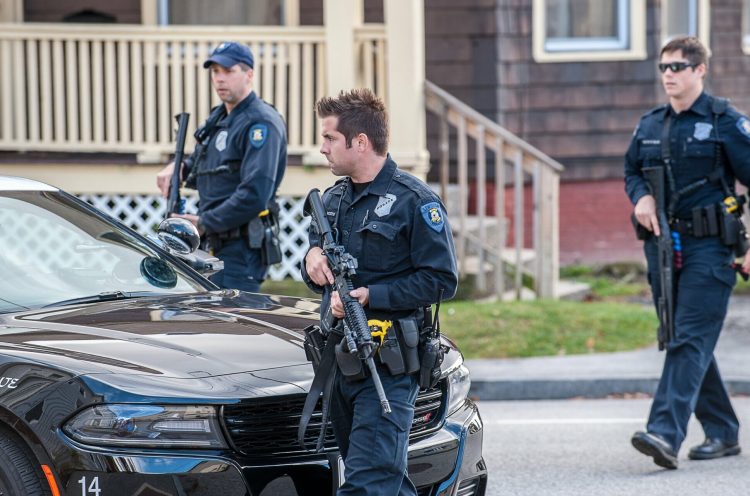Few police departments in Maine test their officers for drug use, and police rarely face the loss of their law enforcement certificate for drug-related conduct, according to state data on drug-testing policy.
In February, Lewiston Police Officer Nicholas Meserve, 34, died of acute fentanyl intoxication, the police department said last week, raising questions about how often police officers are involved with drug activity and whether cities and towns test police for drugs periodically.
“I hope it’s a reminder that the opioid epidemic touches the lives of many in the community, regardless of their wealth, race, religion or profession,” Lewiston Police Chief Brian T. O’Malley said in a statement.
Although pre-employment drug testing is commonplace in the private sector – more than 400 employers have drug-testing policies in the state – few municipalities have universal drug-testing policies, according to the Maine Department of Labor.
“Maine is highly regulated in this sense,” said attorney Tawny Alvarez, a partner at Verrill Dana who practices employment law. The state’s drug-testing statute is designed to protect the dignity of employees, and to ensure that employers do not abuse their power or invade an employee’s privacy. The law also sets the minimum detectable amount of a drug that may be considered a positive test, and also spells out what steps are required or prohibited after a positive drug test.
“If someone tests positive for drugs as an employee, you can’t just dismiss them,” Alvarez said. “You have to offer them a chance to go through rehabilitation before they reenter the workplace.”
Only 13 municipalities or cities in the state list any universal drug-testing policy, and only one town – Baileyville in Washington County – performs pre-employment drug screens, testing with probable cause to suspect employee drug use, and random testing.
Of those 13, only two are police departments: The Houlton Police have conducted pre-employment drug screenings since 2007, and the Penobscot County Sheriff’s office has had a similar policy in place since 1998.
The remaining 11 groups are either cities or towns, and although Lewiston screens its municipal employees, it is unclear whether that policy extends to police, who have a union contract with the city that currently does not include any provision for drug testing.
In Portland, police are subject to a battery of tests before they are hired, including psychological testing, and an extensive questionnaire on past drug use. Each officer also undergoes a polygraph examination, and any red flags are explored in detail before a candidate is offered a position, interim Police Chief Vern Malloch said.
After Portland officers come aboard, they undergo periodic performance reviews, and managers in the police administration use data to monitor whether an officer’s pattern of behavior changes, which might indicate some other, underlying problem, Malloch said. If an officer has a sudden change in the number of incidents in which they use force, or takes an unusual number of sick days, for instance, it could indicate some other struggle.
Police sergeants and lieutenants can suggest the employee seek assistance through an anonymous peer support system, or through an employee assistance program, which all employers are required to maintain.
Only rarely – less than a dozen times a year, on average, Malloch estimated – has he required an officer to check in with an assistance program, he said.
“I can recall where different officers have had bouts with alcoholism and depression, and they’ve brought it to our attention and we helped them receive treatment,” Malloch said. “The last thing we want to do is discourage employees from coming forward because (they think) it will cost them their job.
“We want employees to come forward so we can address it adequately and get the person well so they can return to being a productive officer.”
No one tracks how many of the state’s roughly 2,900 police officers are in recovery for drugs or alcohol, or might say they’ve had a problem with drugs in the past – to do so would be an invasion of privacy. But the state does maintain data on which officers have been accused of a crime, including for drugs or alcohol-related offenses.
More common among police ranks is the use and abuse of alcohol, said Maine Criminal Justice Academy Director John Rogers, who manages the disciplinary process for officers who face losing their law enforcement certificate.
Meserve’s death was the first of its kind that Rogers had heard about.
“I was kind of shocked,” Rogers said. “I’d never seen that in my time here as a director, where you have an officer who dies of an overdose because he has a drug problem.”
Over time, fewer officers have been disciplined for drug-related infractions, according to police discipline data maintained by the Maine Academy of Criminal Justice, which is responsible for conferring law enforcement licenses on all corrections officers and sworn police in the state.
Between 2008 and 2016, the Maine Criminal Justice Academy board acted on 25 cases of drug-involved criminal conduct or past actions by police or corrections officers.
By contrast, in the same time period, the board acted on 69 alcohol cases, mostly for charges of operating under the influence, according to the records.
Send questions/comments to the editors.




Success. Please wait for the page to reload. If the page does not reload within 5 seconds, please refresh the page.
Enter your email and password to access comments.
Hi, to comment on stories you must . This profile is in addition to your subscription and website login.
Already have a commenting profile? .
Invalid username/password.
Please check your email to confirm and complete your registration.
Only subscribers are eligible to post comments. Please subscribe or login first for digital access. Here’s why.
Use the form below to reset your password. When you've submitted your account email, we will send an email with a reset code.